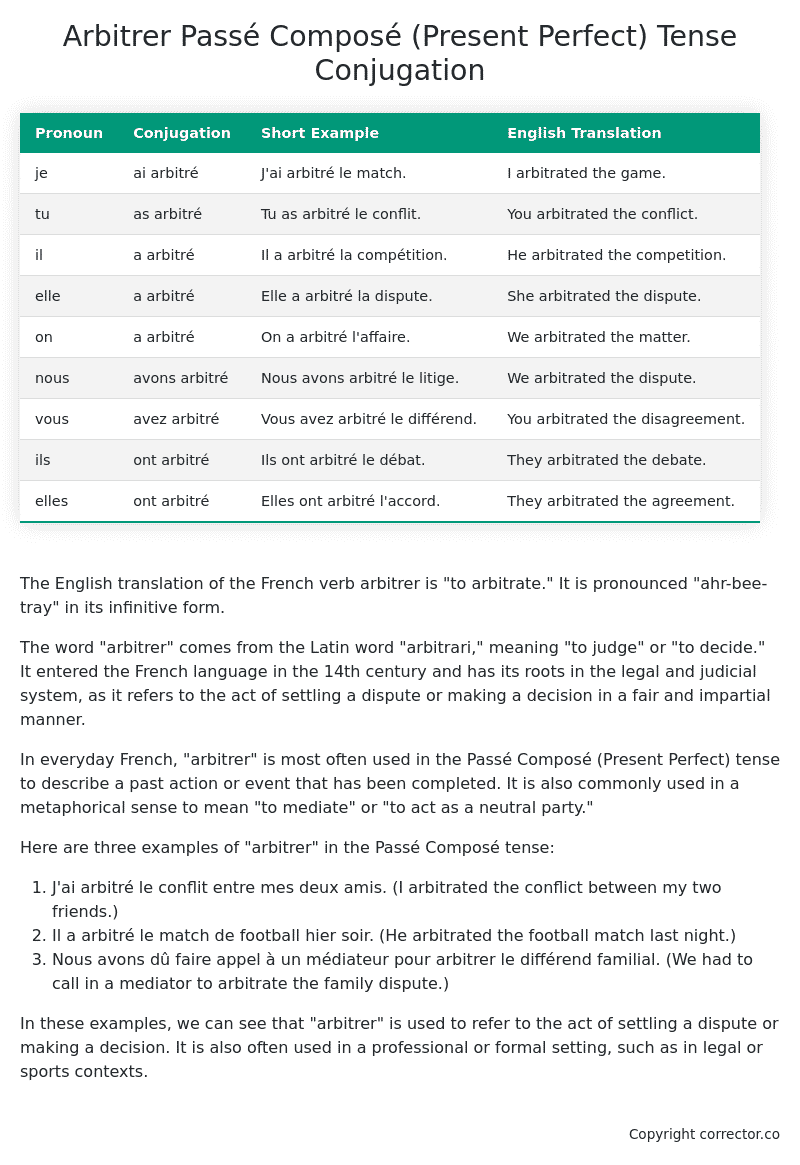Passé Composé (Present Perfect) Tense Conjugation of the French Verb arbitrer
Introduction to the verb arbitrer
The English translation of the French verb arbitrer is “to arbitrate.” It is pronounced “ahr-bee-tray” in its infinitive form.
The word “arbitrer” comes from the Latin word “arbitrari,” meaning “to judge” or “to decide.” It entered the French language in the 14th century and has its roots in the legal and judicial system, as it refers to the act of settling a dispute or making a decision in a fair and impartial manner.
In everyday French, “arbitrer” is most often used in the Passé Composé (Present Perfect) tense to describe a past action or event that has been completed. It is also commonly used in a metaphorical sense to mean “to mediate” or “to act as a neutral party.”
Here are three examples of “arbitrer” in the Passé Composé tense:
- J’ai arbitré le conflit entre mes deux amis. (I arbitrated the conflict between my two friends.)
- Il a arbitré le match de football hier soir. (He arbitrated the football match last night.)
- Nous avons dû faire appel à un médiateur pour arbitrer le différend familial. (We had to call in a mediator to arbitrate the family dispute.)
In these examples, we can see that “arbitrer” is used to refer to the act of settling a dispute or making a decision. It is also often used in a professional or formal setting, such as in legal or sports contexts.
Table of the Passé Composé (Present Perfect) Tense Conjugation of arbitrer
| Pronoun | Conjugation | Short Example | English Translation |
|---|---|---|---|
| je | ai arbitré | J’ai arbitré le match. | I arbitrated the game. |
| tu | as arbitré | Tu as arbitré le conflit. | You arbitrated the conflict. |
| il | a arbitré | Il a arbitré la compétition. | He arbitrated the competition. |
| elle | a arbitré | Elle a arbitré la dispute. | She arbitrated the dispute. |
| on | a arbitré | On a arbitré l’affaire. | We arbitrated the matter. |
| nous | avons arbitré | Nous avons arbitré le litige. | We arbitrated the dispute. |
| vous | avez arbitré | Vous avez arbitré le différend. | You arbitrated the disagreement. |
| ils | ont arbitré | Ils ont arbitré le débat. | They arbitrated the debate. |
| elles | ont arbitré | Elles ont arbitré l’accord. | They arbitrated the agreement. |
Other Conjugations for Arbitrer.
Le Present (Present Tense) Conjugation of the French Verb arbitrer
Imparfait (Imperfect) Tense Conjugation of the French Verb arbitrer
Passé Simple (Simple Past) Tense Conjugation of the French Verb arbitrer
Passé Composé (Present Perfect) Tense Conjugation of the French Verb arbitrer (this article)
Futur Simple (Simple Future) Tense Conjugation of the French Verb arbitrer
Futur Proche (Near Future) Tense Conjugation of the French Verb arbitrer
Plus-que-parfait (Pluperfect) Tense Conjugation of the French Verb arbitrer
Passé Antérieur (Past Anterior) Tense Conjugation of the French Verb arbitrer
Futur Antérieur (Future Anterior) Tense Conjugation of the French Verb arbitrer
Subjonctif Présent (Subjunctive Present) Tense Conjugation of the French Verb arbitrer
Subjonctif Passé (Subjunctive Past) Tense Conjugation of the French Verb arbitrer
Subjonctif Imparfait (Subjunctive Imperfect) Tense Conjugation of the French Verb arbitrer
Subjonctif Plus-que-parfait (Subjunctive Pluperfect) Tense Conjugation of the French Verb arbitrer
Conditionnel Présent (Conditional Present) Tense Conjugation of the French Verb arbitrer
Conditionnel Passé (Conditional Past) Tense Conjugation of the French Verb arbitrer
L’impératif Présent (Imperative Present) Tense Conjugation of the French Verb arbitrer
L’infinitif Présent (Infinitive Present) Tense Conjugation of the French Verb arbitrer
Struggling with French verbs or the language in general? Why not use our free French Grammar Checker – no registration required!
Get a FREE Download Study Sheet of this Conjugation 🔥
Simply right click the image below, click “save image” and get your free reference for the arbitrer present perfect tense conjugation!

Arbitrer – About the French Passé Composé (Present Perfect) Tense
Formation of the Passé Composé
Set the auxiliary verb with either
Conjugate the auxiliary verb
Add the past participle
Common everyday usage patterns
Narrating Past Events
Sequential Actions
Describing Completed Actions
Interactions with other tenses
Imperfect Tense
Conditional and Future Tenses
Summary
I hope you enjoyed this article on the verb arbitrer. Still in a learning mood? Check out another TOTALLY random French verb conjugation!


